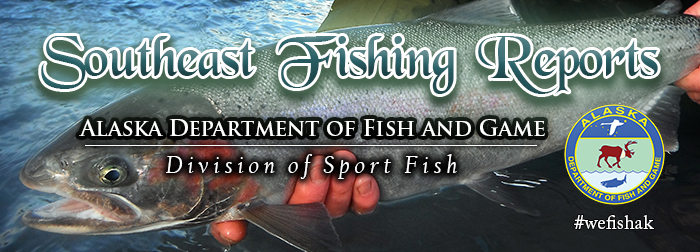
|
||
|
Craig Schwanke, Area Management Biologist (907) 826-2498, craig.schwanke@alaska.gov |
Area Sport Fishing Reports
Prince of Wales Island
October 6, 2025
Fishing season is winding down but there are still good numbers of coho salmon and some colorful Dolly Varden in most drainages. Marine fishing in late September consists of bottomfish such as halibut, lingcod and rockfish with a chance for feeder king salmon. Shrimping and crabbing can be productive during the fall.
Check out the wefishak page on the ADF&G website for the gofishak interactive map to discover fishing locations and information on species run timing, fishing gear selections, and boat and angler access tips!
Chinook (King) Salmon
King fishing is slow and consists of immature or "feeder" kings in the marine waters of Prince of Wales during the fall.
Chinook Salmon Regulations for 2025
- The resident daily bag limit is one fish over 28 inches.
- Nonresident annual harvest is one fish over 28". Any king salmon harvested previously count toward the 1 fish limit.
- Fish such as king salmon, lingcod and demersal shelf rockfish must be recorded on a nonresident anglers license or harvest card immediately upon landing a fish intended for harvest.
Coho (silver) Salmon
There are good numbers of coho in most drainages with the number of colored fish exceeding bright fish fish as they approach spawning later this month. Bait (salmon eggs) is legal on a variety of drainages as of September 15. Please check the regulation book to make sure the drainage you fish does not have a special regulation prohibiting bait. Most drainages have coho runs but good options are Staney Creek, Harris River and the hatchery return at Klawock River. The Klawock River has a large number of silver salmon present.
Trout and Dolly Varden
Rainbow trout, cutthroat trout, and Dolly Varden are available in many of the freshwater drainages of POW. Dolly Varden spawn in the fall so it is a great time to try and catch one displaying their beautiful spawning colors. Trout and Dolly Varden are feeding opportunistically on salmon eggs, sculpins and aquatic insects. Productive drainages for trout include Luck, Klawock, and Sarkar lakes, the Thorne River, and Ratz Creek. Regulations regarding size limits, bag limits, and the use of bait can vary by waterbody, so please check the Southeast Alaska Sport Fish Regulation Summary.
Halibut
Halibut fishing will remain good into the fall.
Lingcod
Lingcod are especially abundant on the west coast of Prince of Wales but can be caught on inside waters as well.
Rockfish
Rockfish can be caught year-round. There is a section on the Fish and Game website for identifying common rockfish of POW.
All sport fishing vessels are required to have at least one functional deepwater release device (regardless of species targeted), and anglers will be REQUIRED to use a deepwater release device to release rockfish to the depth it was hooked or to a depth of at least 100 feet. Please see the Southeast Alaska Sport Fish Regulation Summary or visit your local ADF&G office to see examples of rockfish release devices and learn about their use.
Demersal Shelf Rockfish
The retention of demersal shelf rockfish, including yelloweye is open for residents of Alaska with a daily bag limit of one and possession limit of two.
Demersal shelf rockfish, including yelloweye, closed August 25.
Demersal shelf rockfish are the following species: yelloweye, quillback, copper, canary, china, tiger, and rosethorn rockfish.
Slope Rockfish
Some slope rockfish are common in marine waters surrounding POW. The most common species are silvergrey and vermilion rockfish.
- Resident and nonresidents daily bag limit of one per day; one in possession
Pelagic Rockfish
Pelagic rockfish provide good fishing in the marine waters surrounding POW.
- Season: year-round
- Three per day; six in possession
For additional information regarding rockfish identification and management, please refer to the rockfish conservation page.
Regulation summaries and copies of the news releases are available at the Craig ADF&G office.
For further information, please contact the Prince of Wales Area Management Biologist: Craig Schwanke (907) 826-2498.
